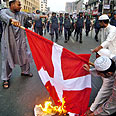
Four years after cartoons of the prophet Muhammad set off violent protests across the Muslim world, Islamic nations are mounting a campaign for an international treaty to protect religious symbols and beliefs from mockery - essentially a ban on blasphemy that would put them on a collision course with free speech laws in the West.
Documents obtained by The Associated Press show that Algeria and Pakistan have taken the lead in lobbying to eventually bring the proposal to a vote in the UN General Assembly.
If ratified in countries that enshrine freedom of expression as a fundamental right, such a treaty would require them to limit free speech if it risks seriously offending religious believers. The process, though, will take years and no showdown is imminent.
The proposal faces stiff resistance from Western countries, including the United States, which in the past has brushed aside other UN treaties, such as one on the protection of migrant workers.
Campaign may reignite tensions
Experts say the bid stands some chance of eventual success if Muslim countries persist. And whatever the outcome, the campaign risks reigniting tensions between Muslims and the West that President Barack Obama has pledged to heal, reviving fears of a "clash of civilizations."
The proposal may have some support in the General Assembly. For several years the Islamic Conference has successfully passed a nonbinding resolution at the General Assembly condemning "defamation of religions."
If the treaty was approved, any of the UN's 192 member states that ratified it would be bound by its provisions. Other countries could face criticism for refusing to join.
The United States has declared it won't accept international treaties that restrict the First Amendment right to free speech.















